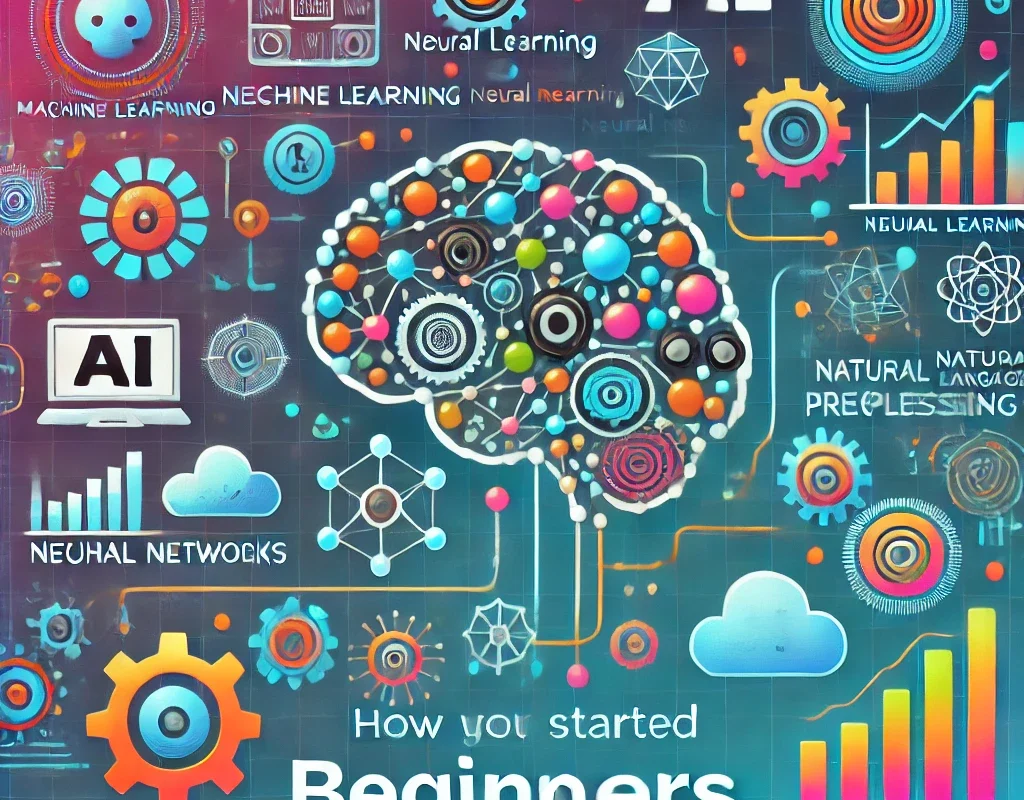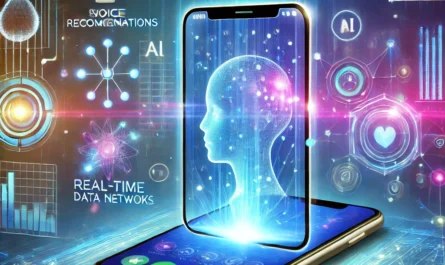Artificial Intelligence (AI) has become a transformative force across industries, from healthcare to finance to entertainment. But how can someone with little to no experience in AI get started? This guide is designed to provide beginners with a step-by-step introduction to AI, covering essential concepts, tools, and practical tips for diving into this fascinating field.
Introduction to Artificial Intelligence for Beginners
Artificial Intelligence might seem intimidating at first glance, with its technical jargon and advanced applications like self-driving cars and virtual assistants. However, AI is more accessible than it appears, and with the right approach, even beginners can begin to understand its principles and use AI tools in everyday life. In this article, we’ll explore how to get started with artificial intelligence for beginners, focusing on the fundamentals and breaking down complex ideas into digestible parts.
What is Artificial Intelligence?
Artificial Intelligence refers to the simulation of human intelligence in machines that are designed to think, learn, and solve problems like humans. AI encompasses a broad range of technologies, including machine learning, natural language processing, and computer vision. These technologies enable computers to perform tasks such as recognizing patterns, making decisions, and learning from data.
Beginners can think of AI as a tool that mimics human cognitive functions, but it can do so on a larger and more efficient scale. To make sense of AI, it’s important to grasp a few key terms:
- Machine Learning: A subset of AI that allows machines to learn from data without being explicitly programmed. It’s like teaching computers to recognize patterns.
- Deep Learning: A more advanced form of machine learning, often used in complex tasks such as image and speech recognition.
- Natural Language Processing (NLP): AI’s ability to understand and process human language.
Why Should Beginners Learn AI?
AI is increasingly integrated into every part of our lives. From recommendation engines on Netflix and Spotify to smart assistants like Siri and Alexa, AI is behind many tools and services that people use daily. For beginners, learning AI opens up a world of opportunities:
- Career Growth: AI skills are in high demand across industries, offering exciting career opportunities.
- Problem-Solving: AI helps automate routine tasks, analyze large datasets, and generate actionable insights, making it a powerful tool for professionals.
- Innovation: Learning AI can spark innovation, enabling individuals to create new applications or improve existing technologies.
Getting Started with Artificial Intelligence for Beginners
Starting your AI journey can be daunting, but there are several simple steps that can help ease the process.
1. Understand the Basics of AI
Before jumping into coding or advanced AI concepts, it’s crucial to build a solid foundation of AI basics. There are numerous free resources available online that introduce AI concepts in a beginner-friendly manner. Courses, blogs, and videos are a great way to start:
- Coursera: Offers free AI and machine learning courses from universities like Stanford.
- edX: Provides access to foundational AI courses from MIT and Harvard.
- YouTube: Channels like “3Blue1Brown” explain complex topics in easy-to-understand visuals.
Reading books on AI is also helpful. Titles like “Artificial Intelligence: A Guide for Thinking Humans” by Melanie Mitchell and “Superintelligence” by Nick Bostrom are popular among beginners.
2. Choose a Programming Language
While you don’t need to be a programming expert to understand AI, having basic programming skills is beneficial. Python is the most popular programming language in AI because of its simplicity and the large number of AI libraries available.
Some popular AI-related libraries in Python include:
- NumPy: A library for numerical computing.
- Pandas: Useful for data manipulation.
- TensorFlow and PyTorch: Two of the most popular libraries for machine learning and deep learning.
You can start learning Python through free platforms like Codecademy or use resources like “Automate the Boring Stuff with Python” to get acquainted with basic programming.
3. Learn AI Concepts through Hands-On Projects
Once you have a grasp of basic AI concepts and programming, it’s time to start experimenting with simple AI projects. Working on projects is the best way to solidify your knowledge and learn how to apply AI techniques to real-world problems.
For beginners, here are some project ideas to get started:
- Build a Chatbot: Chatbots are a great way to learn about natural language processing and machine learning. Tools like Dialogflow can help you create simple bots with minimal coding.
- Create a Recommendation System: Use datasets from platforms like Kaggle to build a recommendation engine for movies or products.
- Image Recognition Model: Try creating a basic image classification model using a dataset of pictures to understand how deep learning works.
4. Explore AI Platforms and Tools
Several AI platforms provide accessible tools for beginners to experiment with AI without needing advanced programming knowledge. These platforms offer drag-and-drop interfaces or simple APIs that can help you apply AI to various projects:
- Google Cloud AI: Offers pre-trained models and machine learning tools that make it easier to integrate AI into applications.
- Microsoft Azure AI: Another platform with tools for machine learning, cognitive services, and automated model creation.
- IBM Watson: Known for its natural language processing capabilities, IBM Watson provides AI services that can be used in customer service, marketing, and more.
Common Misconceptions About AI
AI is often portrayed as a technology that will replace humans, but this is not entirely accurate. AI is a tool designed to enhance human capabilities, not replace them. Additionally, many believe that AI is too complex for beginners to learn, but with accessible resources, AI is within reach for anyone willing to invest time and effort.
Future of AI for Beginners
As AI continues to evolve, there will be even more opportunities for beginners to get involved in AI research, development, and application. The rise of AI-powered tools and platforms has made it easier for non-experts to leverage AI in their work, and this trend is likely to continue. Whether you’re interested in coding, data analysis, or simply understanding AI’s impact on society, the future holds immense possibilities.
FAQs
What programming languages are best for beginners learning AI?
Python is widely regarded as the best language for beginners due to its simplicity and the abundance of AI libraries. R is also a good option for those focused on data analysis.
Do I need a degree in AI to get started?
No, many successful AI practitioners are self-taught. There are numerous online courses and tutorials that can guide you through the learning process.
What are the best resources for learning AI as a beginner?
Some of the best resources include free courses on platforms like Coursera and edX, AI-focused YouTube channels, and books like “Artificial Intelligence: A Guide for Thinking Humans.”
How long does it take to learn AI?
The time it takes depends on your background and the depth of knowledge you wish to acquire. Beginners with no coding experience may take a few months to get comfortable, while others with programming experience can pick up the basics in a shorter time.
Can I use AI without coding?
Yes, platforms like Google Cloud AI, IBM Watson, and Microsoft Azure offer tools that allow you to implement AI without needing to code.
What types of careers can I pursue with AI skills?
AI skills open up a range of careers, from AI engineers to data scientists to roles in research, healthcare, finance, and robotics.
Conclusion
Artificial Intelligence is no longer a concept limited to the realm of science fiction or large tech companies. It is a powerful tool that beginners can start learning today to unlock new career opportunities, improve problem-solving abilities, and innovate in various fields. By understanding AI basics, choosing the right tools, and working on hands-on projects, you can confidently get started on your AI journey.



